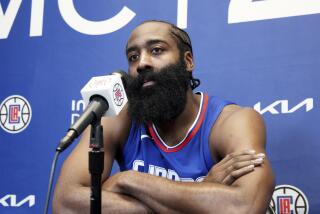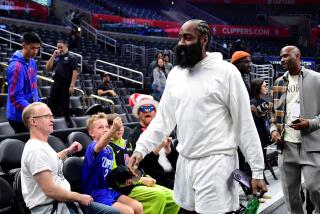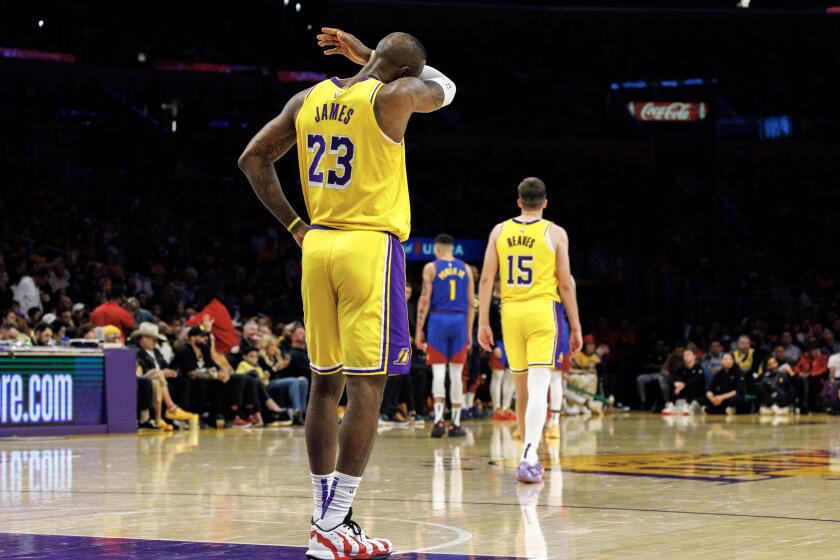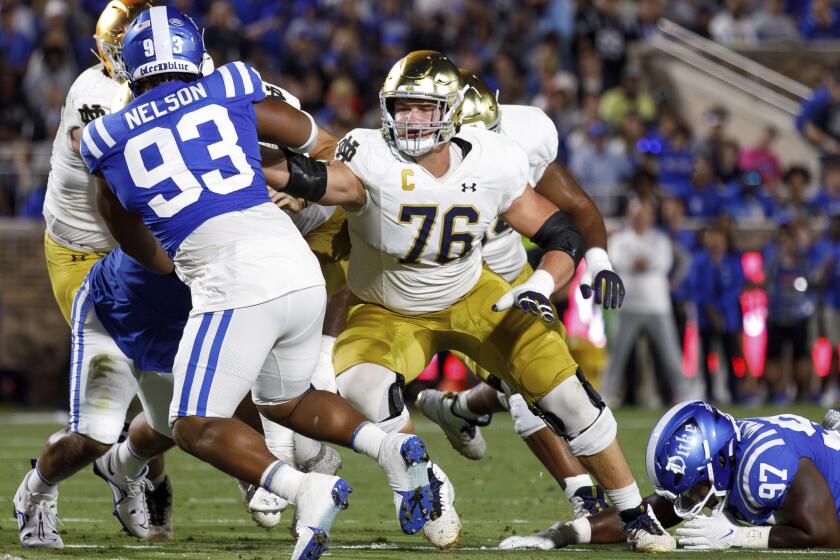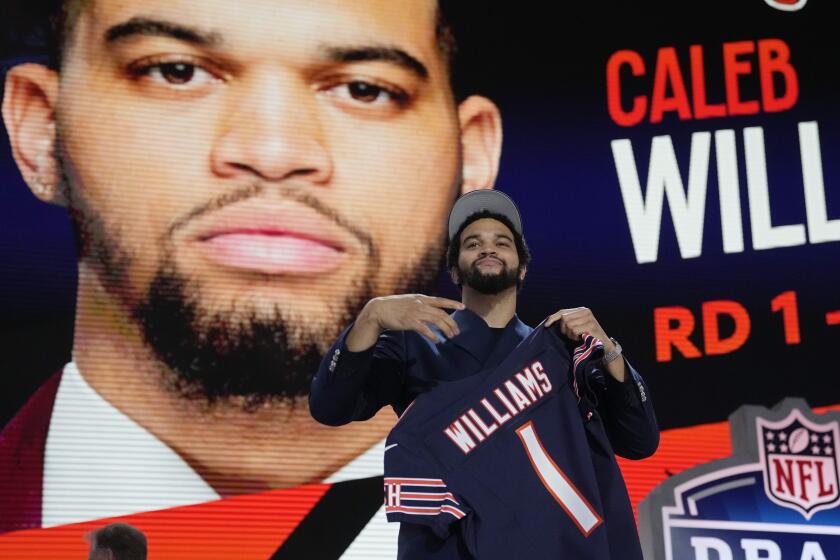For David Stern, questions about possible conflict of interest
After NBA Commissioner David Stern tied the bow on the Clippers’ early Christmas package containing Chris Paul, he said his office had done the right thing.
“It is our belief that [this Clippers deal] is a very good transaction and better for the Hornets and their future in New Orleans than the [Lakers] transaction I did not sign off on,” Stern said in a conference call after approving the Paul-to-Clippers trade Wednesday.
A year ago, the NBA took ownership of the Hornets when the team’s owner wanted to be bought out. With the franchise’s continued residence in Louisiana in peril, Stern began looking for a new owner while Dell Demps served as the team’s general manager.
PHOTOS: Clippers land All-Star Chris Paul
Yet, the chain of events triggered by Stern’s rejection last week of a three-team trade agreed to by Demps that would have sent Paul to the Lakers with Lamar Odom headed to New Orleans and Pau Gasol to Houston revealed how messy it is when a commissioner serves as league boss as well as team owner.
“That’s why there’s a problem with a league operating a team,” said Dan Lazaroff, a professor at Loyola Law School. “Sports is a very different business model” than most industries.
ESPN NBA analyst Jeff Van Gundy on Wednesday characterized Stern’s intervention as inflicting “permanent harm” on the Lakers and Rockets, a reference to the subsequent trade of an unhappy Odom to Dallas for what he viewed as very little in return and the Rockets’ loss of Gasol. “Normal ownership is informed and squashes a deal before it gets done and gets to the media. It’s a slap in the face and smacks of arrogance,” Van Gundy said.
Soon after ESPN aired Van Gundy’s remarks, the league approved the trade that sent Paul to the Clippers for fourth-year guard Eric Gordon, 22; veteran center Chris Kaman, who has an expiring contract; second-year forward Al-Farouq Aminu; and a first-round draft pick in 2012.
A basketball official familiar with the situation, but unauthorized to discuss it publicly, told The Times a lapse in communication between Demps and the NBA caused the confusion over initial reports of Paul being traded to the Lakers before Stern rejected the deal.
Stern on Wednesday apologized for not clarifying what was happening behind closed doors sooner. He maintained that his “sole focus” remained true to attracting a new Hornets owner in 2012, and making the franchise “as attractive and competitive as we can.”
The drawn-out Paul trade negotiations, including reports this week that Paul was headed to the Clippers, only to have the deal appear dead, fueled speculation that small-market team owners such as the Cleveland Cavaliers’ Dan Gilbert were against Stern trading Paul to either team in Los Angeles. Gilbert sent Stern an angry email when reports of the Paul-to-Lakers trade surfaced, writing that 25 NBA teams might as well be the Washington Generals if the commissioner allowed superstars to keep gathering only in major markets.
“Inherently, it was perceived as a conflict of interest, and that’s all that matters,” said David Carter, executive director of USC’s Sports Business Institute.
However, Stern said his rejection of the Paul-to-Lakers deal “was established well before I received that [Gilbert] email.”
In recent years, other leagues have taken control of troubled franchises.
Major League Baseball purchased the Montreal Expos en route to the team’s relocation to Washington, and the NHL took over the Phoenix Coyotes when the team’s owner filed for bankruptcy. This year baseball Commissioner Bud Selig appointed J. Thomas Schieffer to oversee the Dodgers’ business operations.
The NBA situation, however, differed because the Hornets had to deal an unhappy Paul, a superstar point guard, before he might opt out of his contract next summer.
So Stern, after overseeing a tense labor dispute that caused games to be canceled until Christmas because most team owners were railing at the rich-get-richer NBA system, faced a watershed moment before the season’s tipoff.
More business as usual? Or stand up for the little guy? And the little guy was Stern himself.
In wearing an owner’s hat, Stern said his attention wasn’t on how a Paul-to-Lakers deal would “impact life under the collective-bargaining agreement. That’s not the responsibility I undertook as the person responsible for making transactions for the Hornets.”
Stern reviewed the three-team trade that would have sent Odom and the Rockets’ Kevin Martin and Luis Scola to New Orleans, and concluded it was not the right deal, according to several basketball officials familiar with Stern’s thinking but who were not authorized to speak publicly. One factor was that none of the three veteran players destined for New Orleans was an All-Star, and all three had big salaries.
Meanwhile, the Clippers’ package leaves New Orleans with a group of younger players, including a promising talent in Gordon, and with smaller contracts.
“That’s what makes this so interesting,” said Carter, noting how all connected to the business of the NBA realize it’s in their best interest to have star players in the largest markets. “The league [was] protecting the small market.”
William Gould, a labor expert and Stanford law professor, was asked about parallels between Stern’s possible conflict of interest and how other businesses operate. “I just don’t know of anything like that,” Gould said.
The closest comparison, he said, could be covenant agreements that prevent employees who leave a company from sharing intellectual information at a new, rival employer, such as in Silicon Valley.
However, by rejecting the prior Paul deals “for basketball reasons,” Stern effectively invoked the precedent of acting in the best interest of his sport. That was the case in 1976 when baseball commissioner Bowie Kuhn canceled Oakland Athletics owner Charlie Finley’s deal to ship stars Joe Rudi and Rollie Fingers to the Boston Red Sox and ace Vida Blue to the New York Yankees.
“If Kuhn didn’t step in, the Oakland A’s would have become worthless,” Gould said. “That’s why I don’t think this [Paul case] with Stern is a conflict of interest.”
Stern was also aware of another complaint by some critics who have heaped scorn on him for turning a blind eye before to the Lakers stacking their roster with Shaquille O’Neal, then Gasol.
“The howls and cries of conflict of interest might settle down by how the more equitable Clippers’ deal went down, but it doesn’t mean the Lakers and others can’t be dismayed by the process,” USC’s Carter said. “This was a make-up call of sorts by the league that helps skew how this is ultimately viewed.”
twitter.com/latimespugmire
More to Read
Get our high school sports newsletter
Prep Rally is devoted to the SoCal high school sports experience, bringing you scores, stories and a behind-the-scenes look at what makes prep sports so popular.
You may occasionally receive promotional content from the Los Angeles Times.

